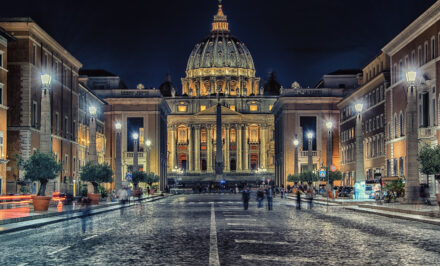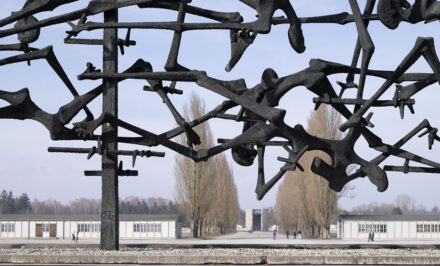 org. February 2014. A young woman entered the Bank with a rather worn savings book. “I happened to find this in a box I haven’t opened for ages,” she said. It was a savings account her grandparents had opened for her when she was still a child. “Is it still valid?” she asked. “Of course, and it will have quite a decent balance by now,” the Bank official replied. Smiling shyly and visibly moved the young woman said, “You little, forgotten and neglected savings book at the bottom of a box, you are now going to fulfil my dream…” On 18 October 1914 Fr Kentenich told the young men sitting in the little shrine in the valley, “which has from time immemorial stood there more or less abandoned, deserted and empty”, about the “greatest apostolic deed” that would forever be connected with this place. Something of the poor stable in Bethlehem where the Saviour of the world was born resonated in his words; they also resonated with the conviction that “so often in world history what was small and insignificant has been the source of the great and greatest things.”
org. February 2014. A young woman entered the Bank with a rather worn savings book. “I happened to find this in a box I haven’t opened for ages,” she said. It was a savings account her grandparents had opened for her when she was still a child. “Is it still valid?” she asked. “Of course, and it will have quite a decent balance by now,” the Bank official replied. Smiling shyly and visibly moved the young woman said, “You little, forgotten and neglected savings book at the bottom of a box, you are now going to fulfil my dream…” On 18 October 1914 Fr Kentenich told the young men sitting in the little shrine in the valley, “which has from time immemorial stood there more or less abandoned, deserted and empty”, about the “greatest apostolic deed” that would forever be connected with this place. Something of the poor stable in Bethlehem where the Saviour of the world was born resonated in his words; they also resonated with the conviction that “so often in world history what was small and insignificant has been the source of the great and greatest things.”
![]()
In a talk given during World War II (on 9 March 1941) when the great powers were in collision, we can feel his emotion almost more strongly as he spoke about the simplicity and greatness of this little shrine when he said,
“You, Bethlehem, in the Land of Judah, are by no means least among the rulers of Judah…” (Mt 2,6). Our hearts involuntarily apply what is said of Bethlehem to our little shrine: You, little shrine down in the valley, you are by no means the least of the places in God’s kingdom, from which God’s Spirit wants to shine out in order to renew the world in the Holy Spirit.
Schoenstatt, little, holy land, you may be largely unknown, you may be small and insignificant …
At the moment the Schoenstatt Family experiences that “all the hopes and expectations of the past months seem to collapse into nothingness, and we have to fear that at the Jubilee of our covenant of love our home will still not be ‘our’ home.”
To this Fr Kentenich says,
“Isn’t it the case that this little shrine is literally the focal point and rallying point of our thoughts and emotions today? Since, according to God’s intentions, this graced little place is obviously meant to be fruitful, graced, and abundantly blessed, we have seen countless, noble-minded people gathering spiritually at this place in the course of the last years to offer themselves body and soul to Almighty God through the Blank Cheque consecration, so that this holy and graced place may be preserved and become fruitful.”
How those words echo in our ears that we have heard so often since 1929, and that fill us all the more with fear and trembling the older we become: In the shadow of this shrine the destiny of the Church will be essentially influenced for centuries.
How those words now resound, “You, Bethlehem in the Land of Judah, are by no means least among the rulers of Judah …”? Schoenstatt, little, holy land, you may be largely unknown, you may be small and insignificant, yet how powerfully God’s blessing rests on you, how powerfully God’s redemptive intentions are connected with this little place.
We bring a blessing into the world
“I am on pilgrimage in covenant solidarity to our Original Shrine” – a motto that has awakened to life in these weeks when hundreds of people take over the task “to show clearly through their lives and apostolate that this little place is our common home, and the source of the specific graces without which we can neither exist nor act as the Family of our Father, and as the Apostolic Movement in the service of the Church and society.”
So in the talk he gave during World War II Fr Kentenich tells us:
We are making use of this opportunity to confess that we owe all the blessings that have been poured out over us until now, all the blessings that have gone out from this holy spot of land, to our Queen, our Mother Thrice Admirable and Queen of Schoenstatt. Her triumphant chariot has to be taken everywhere. We walk humbly in front of and beside her chariot.
That is how we can describe this community. Is it to be blessed? Don’t we experience this blessing today? Isn’t a constantly flowing river of graces pouring over us today? If I take up all that is vibrating through this hall today, through our Schoenstatt land, and if I may express it in words, I would like to say that all of us who have come here today bring blessings, we fetch blessings, and we want to carry these blessings out into the world.
We bring blessings!
How often I was able to say this to myself this morning and in the hours that followed. How much blessing is flowing back to our little shrine today, to the source from which this blessing has flowed. We bring blessings. […]
We fetch blessings
However, we don’t come only to bring blessings, we also fetch blessings from this place.
Involuntarily, as we humbly believe with childlike faith, we think of the rich capital of grace the whole Family collects here and places in the hands of the Blessed Mother. We fetch blessings. We want to go out from here after having been blessed, abundantly blessed, profoundly blessed. …
We bear these blessings into the world.
How can we describe the blessings we have to bear into the world? Also in this regard I want to distinguish between three great rivers of grace.
First of all, it could be the blessing of our God-grounded being.
I ask myself a second time: Which blessing do we want to carry out into the world? The blessing of God-enkindled words.
Simple words, warm words, convincing words, borne by an inner fire – how much blessing they can spread! It is possible that none of us dreamt that we would be allowed to savour a time such as we have today, and yet from the beginning we were so adaptable that we won’t find it difficult to adapt to it. We want to fetch a blessing and carry it out into the world.
Finally, a third, great river of grace we all want to take along with us: the blessing of a God-grounded and God-enkindled life of action. We want to do things in our little everyday lives; we want to proclaim God and Christ in our ordinary, everyday lives.
When everything seemed impossible
At a time when humanly speaking everything seems to be lost, let us look at Bethlehem and the hundred years of our covenant of love. “At the time when the Family was founded, the covenant of love was lived in mutual solidarity on the battlefields and in the trenches [of World War I] … during the exile in solidarity with Fr Kentenich and as a Family on the battlefields of the Church and in our own Family. … Today we are invited to live that covenant solidarity on the fields of the new evangelisation, and to create a covenant culture. This is a no less radical commitment for the spiritual conquest of our living shrine, our Original Shrine, by a missionary and pilgrim Family.
The prophet of the shrine speaks
“You, Bethlehem, in the Land of Judah …” You, Schoenstatt, in the big, wide world, are by no means the least! How many people today speak out the name of the Mother Thrice Admirable! How many people centre and gather today around our shrine! For them it is a symbol of the Divine, of what is genuinely Christian. …
It is possible that the storms will become far more powerful, it is possible that the tiny ship in which we find ourselves will be tossed to and fro by the wind and the waves to such an extent that we will think it is about to sink. Nevertheless, all of us who are gathered here today must always hold unshakeably onto the one, great statement that Vincent Pallotti taught us. He spoke those words at a similar time of revolution: Mater habebit curam! (Our Mother will care for us!) Or, we may think of another statement that comes to us from Alphonsus Liguori, and that shines out to us in our little shrine: Servus Mariae nunquam peribit. (A servant of Mary will never perish).
When we look into the life of the Blessed among Women, we feel that she lived at a time very similar to ours. Everyone was expecting the Liberator, the Redeemer. He is so close to us. When the people in Israel believed that his coming was impossible, the Blessed Mother had a holy encounter with the angel in the holy stillness of Nazareth. She wanted to remain a virgin, nevertheless she was meant to be a mother. When it seemed almost impossible that she would become the Mother of Almighty God, the event was imminent. This is how it will also be for us; at the right moment a glorious victory will follow at the heel of the Mother Thrice Admirable and Queen of Schoenstatt.
Now let us sing what I have been allowed to interpret for you in our Family hymn, “Enfold us in your mantle…”
So, perhaps the time has come to tell our Blessed Mother once more in the spirit of our pilgrimage prayer 2014, “I am on pilgrimage in covenant solidarity to our Original Shrine and ask you to come down again there to your Family.”

![]()
Original: Spanish. Translation (from German): Mary Cole, Manchester, England
Fr. Kentenich`s text are excerpts from a talk given in Schoenstatt, March 9, 1941, to pilgrims, and guests of the ordenartion of Pallottine Fathers and the reception of Schoenstatt Sisters.
![]()
Related articles see:
News Castegory: In Covenant Solidarity towardsour Original Shrine













